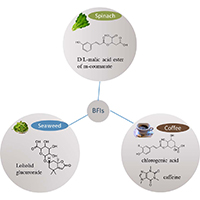PhD defence: Seaweed, spinach, and coffee
Discovery and validation of novel biomarkers of food intake by untargeted metabolomics
Muyao Xi
PhD thesis
Dietary assessment approaches play a major role in nutrition research and might be used more to explore the associations between foods and their effects on health. The information obtained from the traditional assessment of dietary intake is inaccurate and subjective due to recall bias, limited food lists, etc. Data-driven untargeted metabolomics, employing advanced analytical technologies, supporting the measurement of metabolites deriving from the intake of specific foods in biofluids.
These specific compounds, identified and validated as biomarkers of food intake (BFIs), can serve as an alternative to traditional methods of assessing food consumption. Despite plant-based foods having well-known nutritional and potential bioactive properties, they lack specific BFIs which may be crucial for the objective assessment of their effects on health.
This Ph.D. thesis focuses on the identification and validation of BFIs of three consumed plant-based foods from ocean to land, i.e., seaweed, spinach, and coffee. This PhD thesis begins with a comprehensive systematic review to collate previously reported specific compounds associated with seaweed consumption (paper I).
Several candidate BFIs related to seaweed were retrieved from human trials published in the literature. Subsequently, a three-way cross-over human intervention trial was carried out (paper II). Biological fluids were analyzed through an untargeted metabolomics approach, by using UHPLC-QTOF-MS. We discovered four seaweed-related BFIs.
The third work of the thesis regards the identification of spinach intake biomarkers (paper Ⅲ). Three candidate BFIs and 69 effect-like biomarkers were selected by a combination of PLS-DA and student’s t-test. In general, the discovery of BFIs is only the first
part of biomarkers development. Subsequent validation of the BFIs based on published criteria is the last and essential step.
The fourth work of the thesis consisted of identifying and validating coffee intake biomarkers by performing four independent human studies (paper Ⅳ). Through ASCA and PLS-DA statistical analysis, 23 putative urinary biomarkers strongly associated with coffee consumption were selected in common in three parallel intervention studies and identified. Sixteen of the 23 markers were validated against food diaries in the cross-sectional NU-AGE study. Due to the non-specificity of some of these BFIs to coffee intake, combinations of BFIs were evaluated.
2021, 241 pages.
Time
18 June 2021, 13:00
Place
Digital defence.
Opponents
Associate Professor Nina Geiker, (chair), Department of Nutrition, Exercise and Sports, University of Copenhagen, Denmark.
Senior Scientist Claudine Manach, Human Nutrition Unit, Université Clermont-Auvergne, Clermont-Ferrand, France.
Professor Charlotte Jacobsen, National Food Institute, Technical University of Denmark.
Main supervisor
Professor Lars Ove Dragsted, Department of Nutrition, Exercise and Sports, University of Copenhagen, Denmark.
Co-supervisor
Postdoc Giorgia La Barbera, PhD, Department of Nutrition Exercise and Sports, Faculty of Science, University Copenhagen, Denmark.
The thesis is available for inspection at the library, Nørre Allé 51, DK-2200 Copenhagen N.

